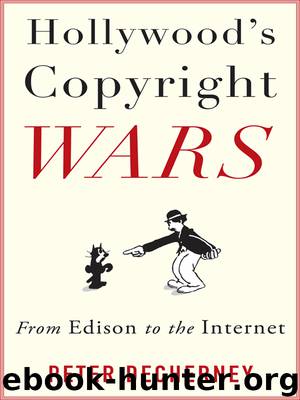Hollywood's Copyright Wars by Decherney Peter

Author:Decherney, Peter
Language: eng
Format: epub
Tags: PER004030, Performing Arts/Film & Video/History & Criticism, LAW050010, Law/Intellectual Property/Copyright
Publisher: Columbia University Press
Published: 2012-04-09T16:00:00+00:00
NEW MEDIA AND NEW ALLEGIANCES
Many of the issues raised in the colorization episode resurfaced fifteen years later when several film directors learned that new companies were using home video technologies to bowdlerize their films. Some of these companies, CleanFlicks for example, bought Hollywood DVDs and sold edited versions, with violence and nudity removed or profanity muted. Other companies, like ClearPlay, developed set-top boxes that could skip scenes and mute dialogue or sound effects in real-time as a DVD played on a consumer’s television. The CleanFlicks version of Steven Spielberg’s Schindler’s List (1993), for example, had forty-three audio or video cuts and ten minutes shaved off of the movie’s total running time. Even Mel Gibson’s passion play, The Passion of the Christ (2005), had three minutes of graphic violence removed. Directors had been complaining for years about studios creating shortened or distorted versions of their films; they were certainly not going to be happy about new start-up companies creating sanitized versions.
There was a twist this time, however, and the legal dispute over film sanitizing marked an important transformation in film directors’ quest for moral rights. Where directors and studios had faced off over moral rights for three-quarters of a century, they now found themselves united against a common enemy. The democratization of video-editing software and the explosion of innovation in consumer video products lowered the barrier of entry for the creation of new versions of Hollywood film. Fans and amateur filmmakers had circulated their own cuts of studio films for decades, but ClearPlay, CleanFlicks, and their competitors were starting legitimate businesses based on the reediting of Hollywood films. The sanitizing companies represented a dual threat both to the artistic integrity of the directors’ work and to the studios’ hegemony over ancillary distribution markets. And the directors and the studios both had reasons to stop this new business model before it established itself.
This lawsuit actually came to the directors, rather than the other way around. In 2002, owners of one of the bowdlerizing companies, Trilogy Studios, grew so proud of their work that they decided to show their edited versions to a group of Hollywood directors, including Rob Reiner and Wes Craven. Trilogy’s owners hoped to license its scene-skipping software to Hollywood, and they were, apparently, surprised when the directors not only failed to praise their work but also threatened a lawsuit. It isn’t clear whether or not the directors really intended to follow through on their threats. But in response, Trilogy joined a number of other editing and scene-skipping companies, who jointly filed a preemptive declaratory judgment case against twelve top Hollywood directors, including Steven Soderbergh and Steven Spielberg. They asked a Colorado court to decide if their method of copying and editing films was covered under the fair use doctrine. The directors turned around and countersued, joined by the Directors Guild of America.82
A Directors Guild representative echoed Ted Turner’s famous “I own it” defense and explained that the editing and scene-skipping companies “have decided what the vision of the movie is to be.
Download
This site does not store any files on its server. We only index and link to content provided by other sites. Please contact the content providers to delete copyright contents if any and email us, we'll remove relevant links or contents immediately.
Social Media Law in a Nutshell by Ryan Garcia & Thaddeus A Hoffmeister(1524)
You Don't Own Me by Orly Lobel(1445)
Intellectual Property Strategy by John Palfrey(1419)
Hello, My Name is Awesome by Alexandra Watkins(1357)
Without Copyrights by Spoo Robert(1346)
Profit From Your Idea: How to Make Smart Licensing Deals by Attorney Richard Stim(1346)
The Trademark Guide by Lee Wilson(1229)
Democracy of Sound by Alex Sayf Cummings(1224)
A Triumph of Genius: Edwin Land, Polaroid, and the Kodak Patent War by Ronald K. Fierstein(1203)
The Copywriter's Handbook by Robert W. Bly(1194)
Kafka's Last Trial by Benjamin Balint(1164)
World War 3.0 by Ken Auletta(1154)
Data Protection: A Practical Guide to UK and EU Law by Carey Peter(1139)
What They'll Never Tell You About the Music Business by Peter M. Thall(1100)
The Tech Contracts Handbook: Software Licenses and Technology Services Agreements for Lawyers and Businesspeople by David Tollen(1085)
Mass Media Law by Pember Don & Pember Don(1080)
BVR's Guide to Intellectual Property Valuation by Michael Pellegrino(1078)
Patent It Yourself: Your Step-by-Step Guide to Filing at the U.S. Patent Office by Pressman David Attorney(1062)
Hello, My Name Is Awesome: How to Create Brand Names That Stick (BK Business) by Alexandra Watkins(1062)
